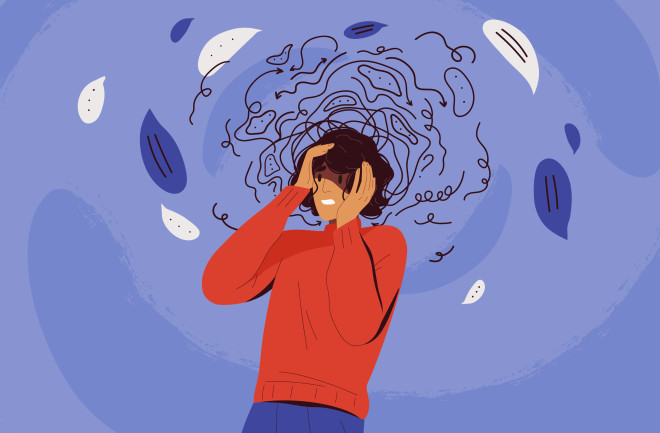
Living with OCD (Obsessive-Compulsive Disorder) and anxiety can be incredibly challenging, but understanding these conditions is the first step towards managing them effectively. This guide will explore what OCD and anxiety are, their symptoms, causes, and treatment options, offering a comprehensive overview for anyone seeking to better understand or cope with these disorders.
Understanding OCD and Anxiety
OCD is a mental health disorder characterized by unwanted and intrusive thoughts (obsessions) and repetitive behaviors or mental acts (compulsions) aimed at reducing the distress caused by these thoughts. Anxiety, while often associated with OCD, is a broader condition that involves excessive fear or worry.
Symptoms of OCD
OCD symptoms can vary widely but commonly include:
- Intrusive thoughts about contamination, harm, or taboo subjects.
- Compulsions such as excessive cleaning, checking, counting, or repeating actions.
- Significant distress and interference with daily life.
Symptoms of Anxiety
Anxiety symptoms may include:
- Persistent worry or fear.
- Restlessness or feeling on edge.
- Difficulty concentrating.
- Physical symptoms like increased heart rate, sweating, or trembling.
Causes of OCD and Anxiety
The exact causes of OCD and anxiety are not fully understood, but several factors contribute:
- Genetics: Family history can play a significant role.
- Brain Structure and Function: Abnormalities in certain areas of the brain are linked to OCD and anxiety.
- Environmental Factors: Stressful life events, trauma, or upbringing can trigger or exacerbate symptoms.
Diagnosis
Diagnosing OCD and anxiety typically involves:
- Clinical Interviews: A mental health professional will discuss your symptoms, thoughts, and behaviors.
- Questionnaires and Assessments: These tools help quantify the severity of your symptoms.
- Medical History Review: This helps rule out other potential causes of your symptoms.
Treatment Options
Effective treatment for OCD and anxiety often includes a combination of the following:
Cognitive Behavioral Therapy (CBT)
CBT is a widely used and highly effective therapy for treating OCD and anxiety. This therapeutic approach helps individuals identify, challenge, and modify negative thought patterns and behaviors that contribute to their distress.
Core Components of CBT:
- Identification of Negative Thoughts: Individuals learn to recognize automatic negative thoughts and the impact these thoughts have on their emotions and behaviors.
- Challenging and Reframing: Through various techniques, individuals are taught to challenge the validity of their negative thoughts and replace them with more balanced and constructive ones.
- Behavioral Activation: Encourages individuals to engage in activities that they have been avoiding due to their anxiety or compulsions, promoting positive experiences and reducing avoidance behaviors.
Exposure and Response Prevention (ERP)
ERP, a specialized form of CBT, is particularly effective for OCD. This technique involves gradual exposure to feared situations or thoughts without performing the compulsive behaviors that are typically used to reduce anxiety. Over time, this helps reduce the fear response and the need to engage in compulsions. ERP typically includes:
- Hierarchical Exposure: Creating a list of feared situations ranked by intensity and gradually working through them.
- Response Prevention: Resisting the urge to perform compulsive behaviors during exposure.
Benefits of CBT and ERP:
- Long-Term Effectiveness: Both CBT and ERP have been shown to produce lasting changes in individuals with OCD and anxiety.
- Skill Building: Patients learn coping skills that they can use independently, which helps maintain progress and prevent relapse.
- Empowerment: Individuals gain a sense of control over their symptoms, enhancing their overall quality of life.
Therapeutic Relationship
The success of CBT and ERP also heavily relies on the therapeutic relationship. A strong, trusting relationship between the therapist and the individual is crucial, as it fosters a safe environment for facing fears and making meaningful changes.
By incorporating CBT and ERP into treatment, individuals with OCD and anxiety can develop effective strategies to manage their symptoms and improve their daily functioning.
Medication
Medication plays a crucial role in managing OCD and anxiety, often in conjunction with therapy. The primary class of medications used are Selective Serotonin Reuptake Inhibitors (SSRIs), which work by increasing the levels of serotonin in the brain, a neurotransmitter that helps regulate mood and anxiety.
Common SSRIs:
- Fluoxetine (Prozac)
- Sertraline (Zoloft)
- Escitalopram (Lexapro)
- Paroxetine (Paxil)
- Fluvoxamine (Luvox)
How SSRIs Work:
SSRIs increase serotonin levels by inhibiting its reuptake into neurons, allowing more serotonin to be available in the brain. This action helps alleviate the symptoms of OCD and anxiety, making obsessive thoughts less intense and reducing overall anxiety levels.
Benefits of SSRIs:
- Reduction of Symptoms: SSRIs can significantly reduce the frequency and intensity of obsessive thoughts and compulsive behaviors, as well as general anxiety.
- Enhanced Therapy Participation: By alleviating severe symptoms, SSRIs enable individuals to engage more effectively in therapeutic interventions like CBT and ERP.
Considerations:
- Time to Effectiveness: SSRIs typically take several weeks to start showing noticeable benefits. Patience and consistent use are essential.
- Side Effects: Common side effects include nausea, headache, sleep disturbances, and sexual dysfunction. It is important to discuss these with a healthcare provider.
- Individual Response: Not all patients respond to SSRIs in the same way. Sometimes, a trial-and-error approach is necessary to find the most effective medication with manageable side effects.
Combination with Other Treatments:
In some cases, SSRIs are combined with other medications, such as benzodiazepines for short-term relief of acute anxiety or antipsychotics for treatment-resistant OCD. This combination approach should be closely monitored by a healthcare professional to optimize treatment outcomes.
Monitoring and Adjustments:
Regular follow-ups with a healthcare provider are crucial to monitor the effectiveness of the medication and make any necessary adjustments. This includes dose modifications or switching to a different SSRI if the initial one is not effective or causes intolerable side effects.
By integrating medication into a comprehensive treatment plan, individuals with OCD and anxiety can achieve better symptom management and improve their quality of life.
Lifestyle Changes
Incorporating healthy lifestyle habits can also be beneficial:
- Regular Exercise: Physical activity can reduce anxiety and improve mood.
- Balanced Diet: Eating a healthy diet supports overall mental health.
- Sleep Hygiene: Ensuring adequate and quality sleep can help manage symptoms.
Mindfulness and Relaxation Techniques
Practices such as mindfulness meditation, deep breathing exercises, and progressive muscle relaxation can help reduce anxiety levels and improve overall well-being.
Support Systems
Building a strong support network is crucial. This can include:
- Therapists and Counselors: Regular sessions with a mental health professional.
- Support Groups: Connecting with others who have similar experiences.
- Family and Friends: Educating loved ones about OCD and anxiety to foster understanding and support.
Coping Strategies
Developing effective coping strategies is essential for managing daily life with OCD and anxiety. Some strategies include:
- Journaling: Writing down thoughts and feelings to better understand and manage them.
- Setting Realistic Goals: Breaking tasks into manageable steps to avoid feeling overwhelmed.
- Time Management: Prioritizing tasks and setting a schedule to reduce stress.
Conclusion
OCD and anxiety are complex and challenging conditions, but with the right understanding and treatment, individuals can lead fulfilling lives. If you or someone you know is struggling with these disorders, seeking help from a mental health professional is a crucial first step. Remember, you are not alone, and support is available to help you navigate these challenges.
By fostering awareness and utilizing the available resources, it’s possible to manage OCD and anxiety effectively, improving overall quality of life.
If You Need Help, We’re Here For You
If you or someone you know is struggling with OCD or anxiety, remember that help is available, and you don’t have to face this alone. Seeking support from a mental health professional can be a crucial step towards managing and overcoming these challenges. Therapy, medication, and a strong support network can make a significant difference. Reach out to a therapist, join a support group, or talk to a trusted friend or family member today. Your journey to healing and a better quality of life begins with taking that first step.
__________________________________
Frequently Asked Questions (FAQ) About OCD and Anxiety
1. What is OCD and how does it differ from general anxiety?
OCD (Obsessive-Compulsive Disorder) is a mental health disorder characterized by unwanted, intrusive thoughts (obsessions) and repetitive behaviors (compulsions) aimed at reducing distress. General anxiety involves excessive fear or worry but does not include the compulsive behaviors seen in OCD.
2. What are common symptoms of OCD and anxiety?
Common symptoms of OCD include intrusive thoughts about contamination, harm, or taboo subjects, and compulsions like excessive cleaning, checking, and counting. Symptoms of anxiety may include persistent worry, restlessness, difficulty concentrating, and physical symptoms like increased heart rate and sweating.
3. How are OCD and anxiety diagnosed?
OCD and anxiety are diagnosed through clinical interviews with a mental health professional, questionnaires and assessments to quantify symptom severity, and a review of medical history to rule out other causes.
4. What treatment options are available for OCD and anxiety?
Effective treatments include Cognitive Behavioral Therapy (CBT), particularly Exposure and Response Prevention (ERP) for OCD, and medications such as Selective Serotonin Reuptake Inhibitors (SSRIs). Additionally, lifestyle changes like regular exercise, a balanced diet, good sleep hygiene, and mindfulness practices can support symptom management.

